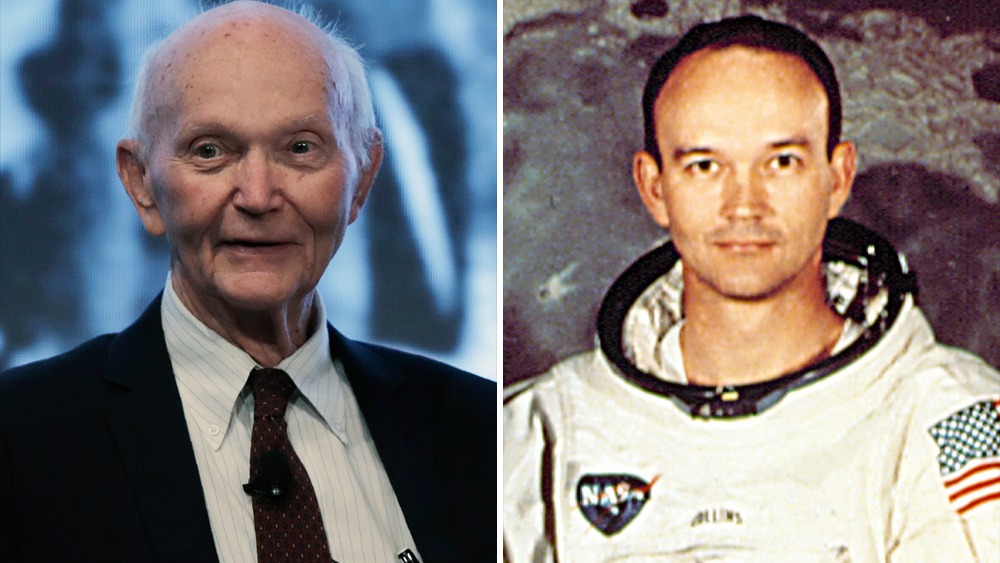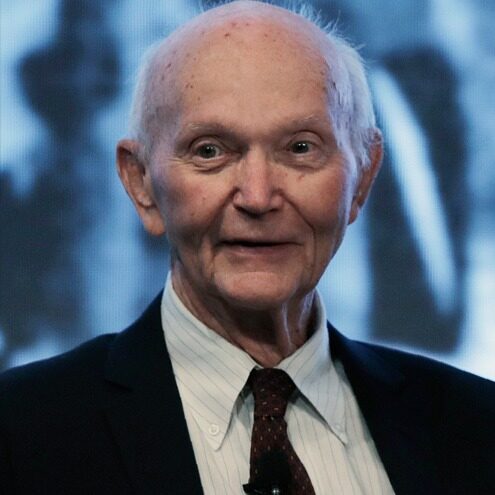Michael Collins, the astronaut who piloted the Apollo 11 spacecraft Columbia as Neil Armstrong and Col. Buzz Aldrin walked on the moon, died of cancer today. He was 90.
His family, which includes daughter Kate Collins, a longtime star of the ABC soap opera All My Children, announced the death on Twitter.
“Please join us in fondly and joyful remembering his sharp wit, his quiet sense of purpose, and his wise perspective gained both from looking back at Earth from the vantatge of space and gazing across calm waters from the deck of his fishing boat,” the family wrote.
NASA Administrator Steve Jurczyk today called Collins “a true pioneer and lifelong advocate for exploration,” noting that as “pilot of the Apollo 11 command module – some called him ‘the loneliest man in history’ – while his colleagues walked on the Moon for the first time, he helped our nation achieve a defining milestone. He also distinguished himself in the Gemini Program and as an Air Force pilot.”
“Michael,” Jurczyk continued, “remained a tireless promoter of space.” Jurczyk quoted Collins saying “Exploration is not a choice, really, it’s an imperative,” and added the the Apollo 11 astronaut was “intensely thoughtful” about his experience in orbit, once noting, “What would be worth recording is what kind of civilization we Earthlings created and whether or not we ventured out into other parts of the galaxy.”
Even as his crewmates trod the lunar landscape, Collins contributed one of the most dramatic moments of the event, and one of the most eloquent reminiscences of it: As he piloted Columbia alone as it traveled over the far side of the moon, all communication with Earth and the two moonwalkers ceased for nearly an hour.
“If a count were taken,” Collins famously wrote in his 1974 memoir Carrying the Fire, “the score would be three billion plus two over on the other side of the moon, and one plus God only knows what on this side. I like the feeling. Outside my window I can see stars — and that is all. Where I know the moon to be, there is simply a black void.”
He described the feeling as “alone now, truly alone.” Emerging from the far side, he was informed by NASA that the Eagle had, indeed, landed.
Collins was featured in the 2007 documentary In the Shadow of the Moon, and the 2019 documentary Apollo 11. He was portrayed by actor Cary Elwes in the 1998 HBO miniseries From the Earth to the Moon, and by Andrew Lincoln in the 2009 TV movie Moon Shot, Lukas Haas in 2018’s First Man and Ryan Kennedy in 2019’s For All Mankind. Actor Andrew Potts played Collins in the 2019 episode of The Crown titled “Moondust,” in which the Apollo 11 astronauts visit Queen Elizabeth and her space-besotted husband Prince Philip.
Born in Rome where his father, Maj. Gen. James Lawton Collins, was stationed at the U.S. Embassy, Collins would later graduate from West Point and become an Air Force pilot. In 1963 he was chosen by NASA to participate in the Gemini and Apollo programs. He left NASA just a year after the moon landing, and the following year was named director of the Smithsonian’s National Air and Space Museum. In his later years he founded a Washington-based consulting firm in Washington D.C., and retired from the Air Force Reserve as a major general in 1982.
According to his family, Collins “spent his final days peaceful, with his family by his side.” (Collins’ wife Patricia died in 2014.) Complete survivor information was not immediately available.
“Mike always faced the challenges of life with grace and humility, and face this, his final challenge, in the same way,” the family statement reads. “We will miss him terribly. Yet we also know how lucky Mike felt to have lived the life he did. We will honor his wish for us to celebrate, not mourn, that life.”

Family Statement on Passing of Astronaut Michael Collins pic.twitter.com/6OAw7CzFaz
— Michael Collins (@AstroMCollins) April 28, 2021


